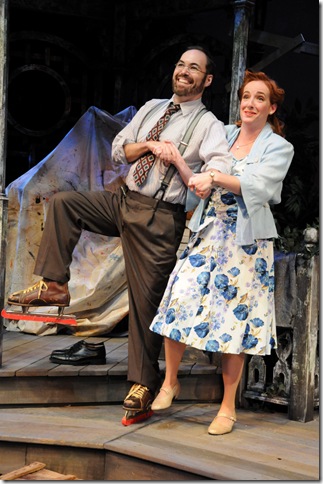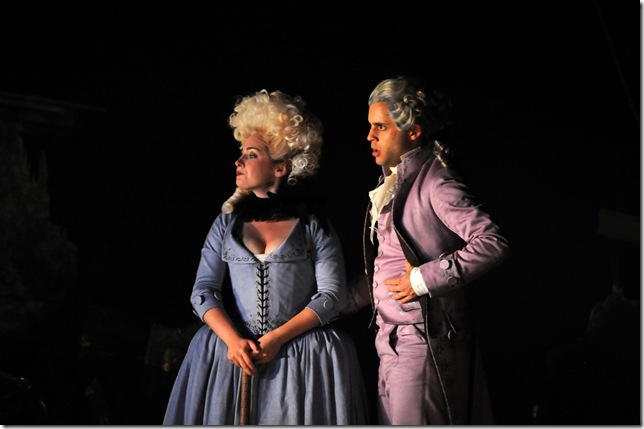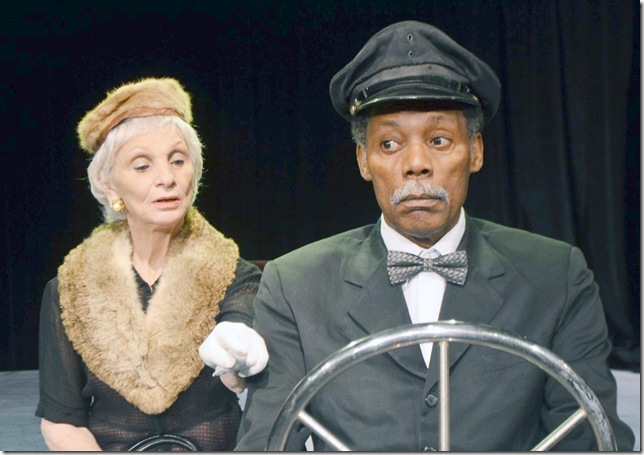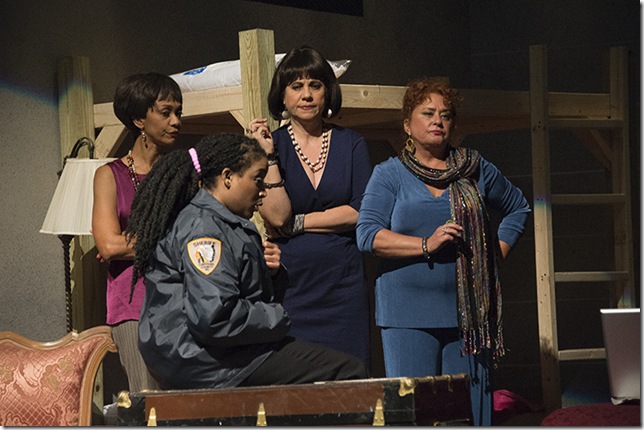Palm Beach Dramaworks prides itself on serving up “theater to think about.” True, there are plenty of heady plays on its schedule this season, but it begins instead with Lanford Wilson’s Talley’s Folly, a charming two-character romance from 1979, more like “theater to sigh over with a constant smile on your face.”
It is a mating dance for an unlikely couple ― Matt Friedman, a Lithuanian Jew from the big city of St. Louis, who has been wooing Sally Talley, the black sheep of her Lebanon, Mo., clan. She is a veteran’s hospital nurse who busies herself tending to World War II wounded, stubbornly resisting the attentions of Matt, who has written her a love note every day for a year.
Now he has driven to Lebanon to convince Sally to marry him and as he tells the audience in an endearing prologue calculated to have us rooting for his success, if everything goes well, the evening should be a waltz, one which lasts exactly 97 minutes.
But Sally does not make it easy for Matt, and for some mysterious reason she is staunchly resistant to his efforts to close the deal. Oblivious to her opposition, Matt plies her with jokes, riddles and impersonations, as the waltz turns into a tug-of-war. Eventually, we learn that each has a complementary secret, an O. Henry-like buried past which explains why they have been talking at cross-purposes, as well as how well-matched they really are.
At Dramaworks, director J. Barry Lewis orchestrates this awkward two-step with heart-on-the-sleeve romanticism, a task made easier by the talents of company veteran Erin Joy Schmidt (Dinner With Friends) and New York actor Brian Wallace in his area debut. Schmidt has the more subdued assignment, taking Sally through a box step of emotions from anger to vulnerability, and back up to rage before arriving at acceptance. Wallace gets the showier role, constantly reaching into a bag of tricks to amuse, distract and persuade Sally, all the time barely concealing his own anxieties. Together they have that essential, indefinable quality known as chemistry.
As usual, resident scenic designer Michael Amico all but steals the show with his atmosphere-rich, dilapidated boathouse ― the “folly” of the play’s title ― where love first blossomed for Matt and Sally a year earlier. Ron Burns lights it expertly, charting the evening’s many moods and Brian O’Keefe costumes the two actors in simple, character-revealing period clothes.
I am not persuaded that Talley’s Folly deserved the Pulitzer Prize. That honor should have come to Wilson for the more substantial Fifth of July, the follow-up play in what would become known as his Talley Trilogy. But if you are looking for a very pleasant evening of theater, nimbly staged and performed, Dramaworks’ Talley’s Folly delivers a true terpsichorean treat.
TALLEY’S FOLLY, Palm Beach Dramaworks, 201 Clematis St., West Palm Beach. Through Sunday. Tickets: $55. Call: (561) 514-4042.
* * *
What is artistic inspiration? Could it really come from God? And if so, why would God choose to inspire a foul-mouthed, obnoxious twit like Wolfgang Amadeus Mozart?
These and other questions were the preoccupations of playwright Peter Shaffer that he ruminates over in dazzling dramatic form in his 1979 work of historical conjecture, Amadeus. One of a handful of great plays from the past half-century, it is theater on an epic scale, both physically and thematically.
At the Maltz Jupiter Theatre, which opens its celebratory 10th anniversary season with the play, Shaffer’s imaginative and, yes, inspired work shines through, even if the production is scaled down to chamber size and the lead performance feels muted and less larger-than-life than the playwright intended.
That leading role is not Mozart, but Antonio Salieri, a sour man with a weakness for sweets, a run-of-the-mill composer who has risen to prominence in the 18th-century Austrian court, favored by the emperor. But he alone sees that Mozart’s work is superior to his, that he will soon fade into oblivion, condemned to “being called distinguished by people incapable of distinguishing.”
The play is fueled by a rumor of the day that envious Salieri caused Mozart’s early demise at age 35. As Salieri takes the audience into his confidence, he confesses his sins and the action flashes back to his initial encounter with the scatological musical genius. By the end of the first act, as Salieri sees his rival’s erasure-free manuscript paper and takes it as proof of divine inspiration, he declares war on God, vowing to bring down the favored Mozart.
 Towering actors from Paul Scofield to Ian McKellen to the 1984 film version’s F. Murray Abraham have played Salieri, dominating the work, leaving Mozart in the dust in support. At the Maltz, Tom Bloom has the acting chops for the role, but director Michael Gieleta seems to be reining him in, evening the match against Ryan Garbayo’s petulant Mozart. Onstage, I prefer evil to triumph, but here it is Garbayo who commands our attention, as the frisky fop of the first act and then as the moody, defeated soul in Mozart’s final days.
Towering actors from Paul Scofield to Ian McKellen to the 1984 film version’s F. Murray Abraham have played Salieri, dominating the work, leaving Mozart in the dust in support. At the Maltz, Tom Bloom has the acting chops for the role, but director Michael Gieleta seems to be reining him in, evening the match against Ryan Garbayo’s petulant Mozart. Onstage, I prefer evil to triumph, but here it is Garbayo who commands our attention, as the frisky fop of the first act and then as the moody, defeated soul in Mozart’s final days.
One of the production’s stars is scenic designer Philip Witcomb, who comes up with a out-of-balance, disintegrating opera house set ― paralleling Salieri’s mental state ― made all the more eery by Andrzej Goulding’s cinematic projections of the spirits that haunt Salieri.
Amadeus is a challenging play, both to produce and to take in. It has plenty to say about the nature of art and it does so with high theatricality. The Maltz production never fully soars, but there is still enough worth chewing on here to warrant a visit with Salieri and Mozart.
AMADEUS, Maltz Jupiter Theatre, 1001 E. Indiantown Road, Jupiter. Through Sunday. Tickets: Starting at $46. Call: (561) 575-2223.
* * *
Like the Maltz, Manalapan’s Plaza Theatre usually sticks to musicals, often low-concept revues. But it too is launching its season with a play, the Pulitzer Prize-winning comic drama, Driving Miss Daisy, a step up from its usual fare that can only help the new company’s reputation.
The play, which first met audiences in 1987, is Alfred Uhry’s valentine to his grandmother, a feisty old member of the Jewish community of Atlanta that the playwright would later revisit in The Last Night of Ballyhoo and Parade.
As the play begins, Daisy Werthan is 72, well past the age when she should be driving according to her solicitous, increasingly exasperated son, Boolie. The inevitable happens quickly, as we hear an offstage car crash ― the result of Daisy putting the vehicle in reverse instead of drive ― and Boolie soon hires a proud, though illiterate, African-American man named Hoke Coleburn to be his mother’s chauffeur.
Daisy takes an instant dislike to the arrangement, because it takes away her independence and because her driver-companion is black. But over the course of 25 years, from 1948 to 1973, a bond of friendship is forged between this odd couple, a development that Uhry parallels with events in the civil rights movement.
The Plaza has attracted first-rate talent for this production, starting with Michael Leeds, one of the most reliable freelance directors in the region. He, in turn, has brought in an impressive cast, particularly John Archie in the pivotal role of Hoke, plus a touching Harriet Oser in the title role and Ken Clement ― the self-described “luckiest son-of-a-bitch he knows” ― as Boolie.
Leeds knows not to clutter the play with directorial conceits, but he trusts the script and guides his veteran cast gently through the numerous vignettes which gradually build in emotional potency.
As Hoke, Archie radiates dignity. He may not be able to read, but he brims with street smarts and understands the value of feigning subservience around white people. Oser adds Daisy to her gallery of roles of women of a certain age, initially cantankerous, but over the arc of the play, the character is left frail and disoriented and Oser manages the transitions along the way deftly. And Clement takes the often two-dimensional, thankless role of Boolie and makes us care about him and his efforts to become parental towards his mother.
Driving Miss Daisy can drift into sentimentality, but at the Plaza, with restrained direction and a trio of worthy actors, it becomes an affectionate, touching portrait of Southern life, a family album to be savored.
DRIVING MISS DAISY, The Plaza Theatre, 262 S. Ocean Blvd., Manalapan. Through Sunday, Nov. 18. Tickets: $45. Call: (561) 588-1820.
* * *
Moving north to Boca Raton is the 10-year-old Women’s Theatre Project, previously located in Broward County, producing plays written by women, usually with all-female casts. That limiting mission is responsible in part for the company’s uneven track record, but few of its scripts have been as flimsy as its current show, Delval Divas.
An inconsequential sitcom about life in a country club-like penitentiary, this collection of cardboard characters in an exaggerated setting is too cartoonish to be taken the least bit seriously, so it soon wears out its welcome.
The title of Barbara Pease Weber’s play refers to the inhabitants of the Delaware Valley Federal Correctional Facility, a comfy, though confining establishment that pampers its inmates with gourmet meals, cocktail hours and manicures. Typical of the play’s humor is the opening scene, which sees computer hacker Beth (Jacqueline Laggy) in anguish over being told her time is up. No, she is not being executed, merely released from Delval to the less cushy conditions of the outside world.
Collectively, the prisoners of Beth’s cellblock comprise a tight-knit sisterhood. There’s doctor Linda (Karen Stephens) who was convicted of insurance fraud, stock-finagling lawyer Rosemary (Sally Bondi) and Stella (Jessica K. Peterson), a larcenous Wall Street manipulator. Oh, and their guard Lucille (Lela Elam), who mixes a mean martini and is more maid than sentry.
Anyway, two events soon disrupt their well-ordered life behind bars. Into their enclave of white-collar criminals comes Sharon (Lisa Kerstin Braun), an unhinged hairdresser convicted of murdering her ex-husband’s latest wife. Worse yet, they learn that Delval is about to be closed down, and the five of them to be dispersed to other more stringent facilities. Unless, that is, the divas can get sufficient evidence against the crooked warden, get him fired and save Delval.
The outcome is never in doubt; it just doesn’t arrive soon enough. The cast emerges relatively blameless, as does director Genie Croft ― the company’s artistic head ― unless she happened to have selected this dud. The Women’s Theatre Project could become a valuable part of Palm Beach County’s theatrical landscape, but it has to offer better material than Delval Divas.
DELVAL DIVAS, The Women’s Theatre Project, Willow Theatre at Sugar Sand Park, Boca Raton. Through Sunday, Nov. 18. Tickets: $25. Call: (561) 347-3948.



